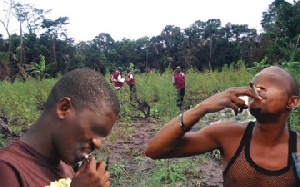The Drug Law Enforcement Unit of the Ghana Police has called for decriminalisation of cannabis, popularly referred to as 'Wee', to help in fight against the abuse of the narcotic drug in the country.
The Head of the Unit, David Selom Hukportie told TV3 “we also need to look at decriminalisation and here, I want to reiterate what Mr. Akrasi Sarpong said.
“Many people misunderstood him but when you look at the situation and you want law enforcement to tackle it without the criminal justice coming in to help it, it will be a problem.”
The Unit has between January and February this year recorded 32 cases with Ashanti Region leading the chart with 28 cases.
In the Regional Drug Auditing table available at the Unit, cannabis has been leading the chart for the past three years.
In 2014, 188 cases were recorded across the country. The figure increased to 298 in 2015 with Ashanti Region leading with 143 cases.
Most of the discussions in the public have all been based on moral justification and exaggeration of the effects of the marijuana with scientific evidence thrown out of the window.
A security expert, Emmanuel Kotin, the debate should be looked at beyond morals and effects.
He indicated that “the drug issue has moved away from being a problem to being a real security issue. We seem to neglect the spillover of this drug issues on our human capital, our social infrastructure and our productive national asset.”
In an effort to solve the myriad of challenges confronting the state in battling the fight, a lecturer at the department of Sociology School at the University of Ghana Dr.Samson Obed Appiah, said the issue should be tackled at the community level.
He was of the view that “the locals in these communities should be looked at firstly from the point that they are involved in the production indirectly or encourage the production of the substance.
“This is also because young people get money and support the local economy so whether you like it or not it is a source of income for them so it would be difficult for the other persons in these communities to give out or report those involved in the growing, production or sale of the cannabis.”
He therefore calls on the law enforcement agencies to engage the traditional authorities in the fight to make it successful.
General News of Wednesday, 11 May 2016
Source: tv3network.com

















